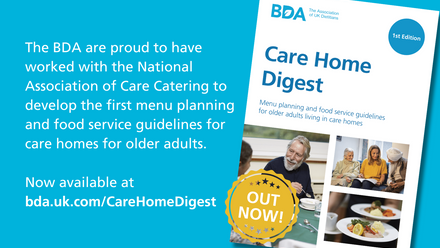Malnutrition is a condition which happens when you do not get the correct amount of nutrients from your diet.
Malnutrition is a major public health issue in the UK. There are approximately three million people in the UK who are malnourished or at risk of malnutrition. The majority live in their own homes.

Malnutrition can:
- increase risk of illness and infection
- slow wound healing
- increase risk of falls
- lead to low mood
- reduce energy levels
- reduce muscle strength and therefore mobility
- reduce quality of life
- reduce independence and ability to carry out daily activities
This Food Fact Sheet will help you understand the signs of malnutrition and how to either stop it from happening or to manage it.
Spotting malnutrition
Malnutrition can affect anyone, but it is more common for older adults and those who are living on their own. This can be because they can’t get out much or because they have poor physical or mental health. It can happen over a long period of time which sometimes makes it harder to spot. Common signs of malnutrition are:
- unplanned weight loss – which can cause clothes, dentures, belts or jewellery to become loose
- loss of appetite
- lack of interest in food and/or drinks
- loss of muscle strength
- tiredness
- alterations in mood
Preventing malnutrition
A balanced diet is essential for health and wellbeing. This should include all the nutrients which we need to eat including protein, energy (calories) and vitamins and minerals. If you follow the points listed here, you are likely to have a balanced diet:
- Eat three portions of high protein foods every day. Sources include meat, fish, eggs, nuts, beans, pulses, soya, tofu or other meat-free sources
- Aim for two to three portions of milk or foods made from milk every day e.g. cheese, milk and yoghurt or non-dairy alternatives like soya milk. If you are having non-dairy milk, choose non-organic versions as they have added nutrients so that it’s similar to dairy milk
- Eat a serving of starchy food at each meal (e.g. bread, cereals, potatoes, yam, plantain, pasta, chapatti or rice)
- Eat some fruit and vegetables every day (fresh, frozen, tinned, dried or juiced)
- If you enjoy fish, have two portions a week of oily fish such as mackerel, salmon, herring, trout, pilchards or sardines. These are rich in omega-3 fatty acids and can be tinned or frozen for convenience
- Choose drinks which you enjoy. Aim to drink at least 1600ml (3 pints) of fluid per day if you are a woman, and 2000ml (3½ pints) if you are a man.
Managing malnutrition
When someone has a poor appetite and is malnourished, nutrient dense foods and drinks can help to improve nutritional intake without making portions too big to manage. Nutrient dense foods and drinks contain a wide range of nutrients including energy, protein, vitamins and minerals and may also contain fibre. The easiest way to tell if a food or fluid is ‘nutrient dense’ is to think about whether it is something designed by nature to support a new life (e.g. egg, milk or whole pulses or nuts).
Try to increase your intake by about an extra 500 kcals per day using nutrient dense food. Use the ideas below to guide your choices:
Eat ‘little and often’ – good nutrient dense between-meal snack ideas include:
Table 1
|
Ready-made nutrient dense snack |
Portion size |
Approx protein content (g) |
Approx energy content (kcal) |
|
Cheese and cracker |
1 cracker + 1 small chunk of cheese |
6 |
115 |
|
Cheese scone |
½ scone |
6 |
120 |
|
Custard |
150g tub |
4 |
145 |
|
Falafel |
2x 22g |
4 |
110 |
|
Greek yoghurt |
150g tub |
9 |
200 |
|
Hard-boiled egg |
1 |
7 |
75 |
|
Nuts |
Small handful (40g) |
9 |
245 |
|
Rice pudding |
150g tub |
5 |
140 |
Add extra nutrition to foods and fluid using nutrient dense ingredients. See below for ideas:
Table 2
|
Nutrient dense food fortifier |
Quantity that could be added to 1 portion of food |
Approx protein content (g) |
Approx energy content (kcal) |
Could be added to a portion of:
|
|
Cheese, grated |
1 tablespoon (10g) |
3 |
40 |
Potatoes, vegetables |
|
Egg |
1 |
7 |
75 |
Custard, milk puddings, mashed potato |
|
Dried, skimmed milk powder |
1 tablespoon (15g) |
6 |
55 |
Custard, milk puddings, ‘cream of’ soups, porridge, mashed potato |
|
Greek yoghurt |
1 generous tablespoon (45g) |
2 |
60 |
Porridge |
|
Ground nuts e.g. peanuts or almonds |
1 tablespoon (15g) |
3 |
90 |
Vegetable soups, stews, casseroles, curries, porridge |
|
Nut butter e.g. peanut butter |
1 tablespoon (15g) |
4 |
95 |
Porridge, vegetable soups, stews, casseroles, curries |
|
Paneer, grated |
1 tablespoon (10g) |
3 |
35 |
Curries |
|
Pea protein powder |
1 tablespoon (17g) |
11 |
60 |
Vegetable soups, stews, casseroles, curries |
|
Soy protein powder |
1 tablespoon (14g) |
14 |
50 |
Vegetable soups, stews, casseroles, curries |
- Choose drinks which contain some nutrition such as milky drinks (malted drinks, hot chocolate, lassi, peanut punch, milky coffee, smoothies and milkshakes). Try not to have drinks just before meals to avoid feeling too full to eat
- Avoid low energy versions of foods and drinks e.g. skimmed or semi-skimmed milk, very low fat or fat free yoghurt
- Choose meals that you enjoy, are easy to prepare and eat, and are nutrient dense. Items such as tinned fish or beans are easily stored and prepared
- If you are preparing food for others, remember that as we get older, our taste buds may change. Older adults may prefer stronger or sweeter tastes than they used to
Ready meals, meal delivery services and online shopping
You may find that your energy levels change throughout the week and that on some days you feel better than others. Here are some suggestions to help make preparing meals easier:
- Make the most of the days when you have more energy by preparing extra meals which you can store in the fridge/freezer as individual portions
- Buy a selection of fresh or frozen ready meals for times when you are not able to cook
Make use of supermarket online shopping and home delivery services which may make shopping easier for you. Meal home delivery services are also available, such as local Meals on Wheels, Wiltshire Farm Foods and Oakhouse Foods.
Swallowing
If you notice any of the following when eating or drinking you should seek advice from a healthcare professional such as your GP or practice nurse, who may refer you to a speech and language therapist or another practitioner who specialises in swallowing difficulties:
- difficulty swallowing
- choking or coughing when eating or drinking
- bringing food back up, sometimes through your nose
- a sensation that food is stuck in your throat or chest
- a change in the sound of your voice whilst/soon after eating i.e. your voice sounds ‘wet’
Other things to consider:
- Check dentures fit correctly - if not, visit your dentist
- If you also suffer from constipation, try to ensure you drink enough (see above). Try gradually increasing your fibre intake by consuming beans, lentils, fruit and vegetables and wholegrain foods as part of your meals and snacks. You may need to fortify these foods – see Table 2
- Regular exercise may help increase your appetite and build up your strength. Start with something easy for you and increase the intensity of exercise gradually
- If you have vision problems or for people living with dementia, try using a non-patterned, plain coloured plate so that the food stands out from the plate
- If you have difficulty using cutlery or with coordination, try ‘finger foods’ such as toast, sandwiches, biscuits, chunks of meat, cheese, vegetables or fruit cut into pieces
Eating environment
Try to make sure that where you eat is as pleasant as possible and that meals and snacks look appealing. Eating with others often helps to encourage appetite.
Summary
Malnutrition is a common problem and if it is not spotted or treated it can make you unwell.
The simple steps outlined above should help to identify and treat the condition. If these simple steps do not seem to help, seek further advice from a healthcare professional.
Top tips
- Malnutrition can affect anyone, but it is more common for older adults and those who are socially isolated
- A balanced diet is essential for health and wellbeing and should include all the nutrients which we need including protein, energy (calories), vitamins and minerals and fluid
- Nutrient dense foods and drinks contain a wide range of nutrients including energy, protein, vitamins and minerals and may also contain fibre
- When someone has a poor appetite and is malnourished nutrient dense foods and drinks can help to improve nutritional intake without making portions too big to manage
- Choose meals that you enjoy, are easy to prepare and eat, and are nutrient dense
- Add extra nutrition to foods and fluid using nutrient dense ingredients
- Eat ‘little and often’ – try having a small nutrient dense snack between meals
- Choose drinks which contain some nutrition such as milky drinks
Source(s)
Baldwin & Weekes, Dietary advice with or without oral nutritional supplements for disease-related malnutrition in adults (Review) (2021) Cochrane
- States “it is reasonable to presume that any benefits from ONS reflect their functional contribution to an increased nutrient intake (or balance of nutrients). It follows that if a similar increase in nutrient intake can be achieved by dietary means rather than using ONS, it is reasonable to expect similar clinical benefits.”
Dorrington, Fallaize, Hobbs, Weech & Lovegrove (2020) A Review of Nutritional Requirements of Adults Aged ≥65 Years in the UK. The Journal of Nutrition Critical Review
- States “Data extracted from a total of 190 selected publications provided evidence to support age-specific UK recommendations for protein (1.2 g/kg/day), calcium (1000 mg/d), folate (400 μg/d), vitamin B12 (2.4 μg/d), and fluid (1.6 litres/d for women, 2.0 litres/d for men) for those ≥65 y. UK recommendations for carbohydrates, free sugars, dietary fibre, dietary fat and fatty acids, sodium, and alcohol for the general population are likely appropriate for older adults”
NICE Clinical Guideline 32 Nutrition support for adults: oral nutrition support, enteral tube feeding and parenteral nutrition (2006; updated 2017)
- States “the overall nutrient intake of oral nutrition support offered [should] contain a balanced mixture of protein, energy, fibre, electrolytes, vitamins and minerals”
NICE Quality Standard 24 Nutrition support in adults (2012)
- States “It is important that nutrition support goes beyond just providing sufficient calories and looks to provide all the relevant nutrients that should be contained in a nutritionally complete diet”
Nutrition claims [Internet]. Food Safety. European Commission; [cited 15 September 2022]. Available from: https://food.ec.europa.eu/safety/labelling-and-nutrition/nutrition-and-health-claims/nutrition-claims_en







